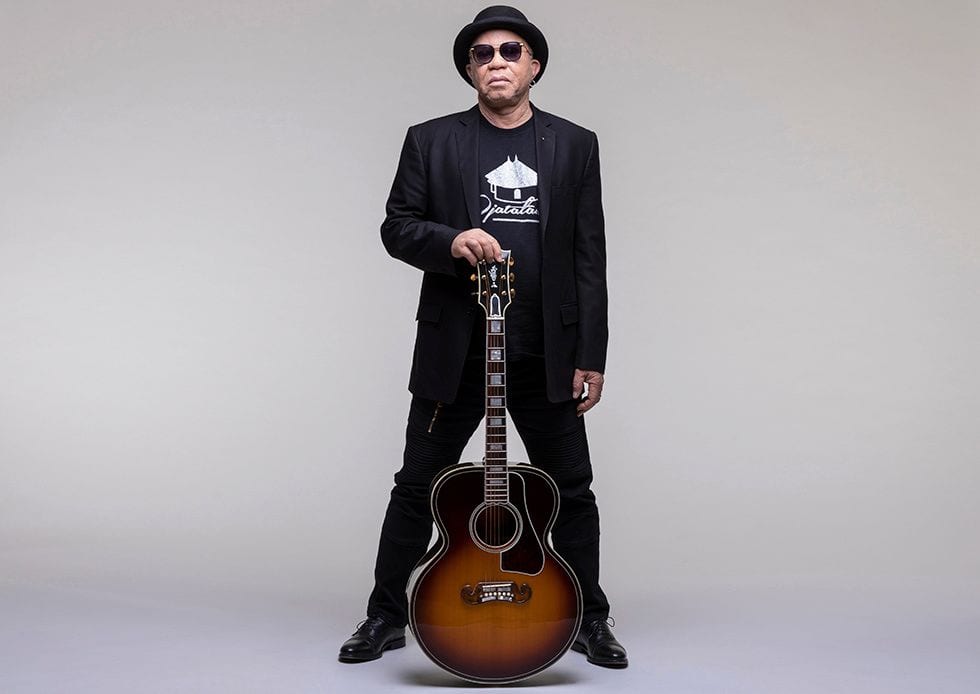
Born into a royal lineage in the Malian village of Djoliba, Salif Keita’s albinism, considered a symbol of bad luck in Mandinka tradition, kept him from ever claiming his princely title. What it could not do, though, was stop his musical career. He first entered the Bamako music scene in the late 1960s. Political unrest drove him to the Ivory Coast, and from there, a desire for a broader audience took him to Paris. He has won awards, been nicknamed “The Golden Voice of Africa”, and established himself as a public voice for Africans with albinism, some of whom still face persecution and brutal deaths due to lingering beliefs attributing magical properties – beneficial and unfavorable alike – to the condition.
The basic human rights of albinistic people have long been a theme in Keita’s activism and music, and on Un Autre Blanc, the album the artist says will be his last, such is still the case. He sings out his truth atop layers of brass, drums, and electric guitars, performing alongside fellow legends like Angélique Kidjo and Ladysmith Black Mambazo. Now 50 years into his recording career, Keita has a voice that never seems to lose its luster, and his spirit comes through powerfully on his latest work.
In the past, some have criticized the sheen of Keita’s production. There are moments on Un Autre Blanc that do feel close to unpalatably slick, but for the most part, the high production values here allow for Keita’s music to come through with feeling rather than glide through the uncanny valley. The bluesy strength that comes through on such melancholy tracks as “Bah Poulo” and “Tonton” is particularly moving, emotion working in tandem with melody to transcend any given language barrier. In fact, Keita’s passionate lyrical delivery is nearly perfect from start to finish, with the unfortunate exception of “Gnamale”. Here, Keita’s voice is heavily Auto-Tuned, and the aesthetic clash with delicate strings and the warm harmonies of Ladysmith Black Mambazo is hard to enjoy.
Elsewhere, though, electronics enhance rather than disrupt. Opening track “Wele Wele” uses them to good advantage, simple beats driving forward behind psychedelic guitar work, kora strumming, and a chorus of backing voices, as well as Keita’s own powerful lead. Slow ballad “Syrie” rests on a foundation of synth chords, a base on which Keita’s cries may better echo among horn flourishes.
Often, more simplicity is even better; take Yemi Alade duet “Diawara Fa”, one of the most heartstring-tugging moments of the album. A more upbeat cut is “Itarafo”, a duet with Angélique Kidjo that incorporates her eternal artistic fire into Keita’s soul sounds. The lush guitar opening to “Lerou Lerou” makes room for a complement of female vocals to come in with some of the softest, most pitch-perfect accompaniment on the album.
Only time will tell if Un Autre Blanc turns out to be Salif Keita’s true farewell to the music industry. Almost 70, Keita has certainly earned the right to take a new path, whether of business or leisure. In the meantime, his impact on behalf of Africans with albinism has been considerable, and his renowned “Golden Voice” bound to live on as a stunning legacy. If it is a true finale, Un Autre Blanc is, by and large, a strong one.


![Call for Papers: All Things Reconsidered [MUSIC] May-August 2024](https://www.popmatters.com/wp-content/uploads/2024/04/all-things-reconsidered-call-music-may-2024-720x380.jpg)



